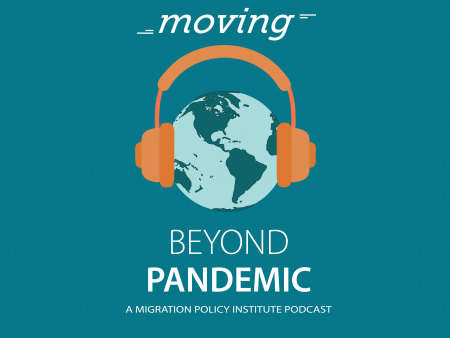 Title Moving Beyond Pandemic
Title Moving Beyond Pandemic
Host Meghan Benton
Organization Migration Policy Institute
Access the Podcast and more information here.
Episodes already available
Digital Health Credentials in India and Africa: Are COVID-19 Travel Passes Catalyzing New Tech Innovations?
Digital health credentialing is one of the key tools for safely returning to pre-pandemic levels of mobility and planning for the next public health crisis. Digital innovations - including automated verification of health and vaccination results - are reopening global economies and mobility, while setting the standard for new ways of managing mobility and health that will survive the pandemic, especially in regions with lower levels of digital use and more limited health and border management systems. Notably, India's DIVOC system and the African Union's Trust Traveler system are examples of how the pandemic has fueled large-scale innovation in this regard. In this episode, these developments are discussed with Dr. Pramod Varma, chief architect of India's digital identity program, Aadhar, and its COVID pass system, DIVOC; Dr. Edem Adzogenu, co-chair and founder of the Afro Champions Initiative, which supports regional integration and implementation of the African Continental Free Trade Agreement; and Lawrence Huang, an associate policy analyst at the Migration Policy Institute (MPI) who works on its Task Force on Borders and Mobility during and after COVID-19.
The Corporate World’s Response to COVID-19 Pandemic, its Omicron Variant, Digital Nomad Visas & More
The COVID-19 pandemic had a dramatic effect on the business sector, disrupting operations, initiating a shift in thinking about the office environment, and chilling business trips. How did the business world react? And how do COVID-19 protocols, new innovations, and trends in work practices affect the decisions companies make about their workers' mobility? In this episode, two former government officials who are now in the private sector - Ian Robinson of immigration law firm Fragomen and Brendan Ryan, CEO of Nomadic, which provides digital solutions for corporate travel - are interviewed about the trends and political environment shaping corporate mobility decisions, whether the rise of the Omicron variant may impede plans to reboot travel, and whether the rise of Nomadic digital visas represents a fad or a permanent change.
Revisiting the Role of COVID-19 Travel Restrictions in Light of Delta and Other Variants
No one expected that the travel restrictions imposed at the start of the COVID-19 pandemic would last so long or remain so confusing, in part due to the arrival of more contagious variants such as the delta variant - with significant effects on family reunification and humanitarian protection, business and leisure travel, and international migration. More than 18 months later, debates continue about the effectiveness of these measures in meeting public health goals. Experts are, however, working to learn from the COVID-19 response to improve decision-making for dealing with future cross-border pandemics. In this episode, Dr. Kelley Lee, head of the Pandemics and Borders initiative at Simon Fraser University in Canada, talks about what the future holds, and whether decision-makers truly learn to adapt or instead take the playbook from the last crisis.
Could Curbing Globalization Prevent Future Pandemics?
Pre-COVID-19, we live in a hyper-global world. There were 1.5 billion international tourism trips annually, almost 40 million flights, and 272 million international migrants. This raises a provocative question: does international mobility contribute to the spread of pandemics? In this episode, Michael Clemens and Thomas Ginn of the Center for Global Development are interviewed. Based on their research on global pandemics dating back to 1889, they argue that limits on cross-border mobility delay the arrival of pathogens by a matter of days at best. Instead, they argue that the greatest success is achieved with domestic measures, not permanent limits on international mobility.
The COVID-19 Shock to the System of Human Mobility and the International Response
The pandemic has been a huge shock to the international mobility system, from the chaotic way countries closed their borders in March 2020, leaving countless travelers and migrants stranded, to the freezes imposed on visa processing that have halted many international migrations. As the world reopens, how do we need to improve global governance to safely restart human mobility? In this episode, an interview is conducted with Elizabeth Collett, Special Advisor to the Director General of the International Organization for Migration, to get an overview of what is happening with migration and mobility and discuss the challenges and opportunities the pandemic poses for global governance.
Human Smuggling in an Age of Pandemic
As COVID-19 chilled global mobility, damaged economies, and caused border closures and travel bans around the world, the pandemic had an effect on the world of shadow migration. In this episode, an interview is conducted with irregular migration and human smuggling expert Matt Herbert on how the public health crisis has muddied the decision-making calculus for would-be migrants, pushing many towards more dangerous routes. The business models of smugglers that facilitate many irregular movements are also examined.
Austria’s Vienna Airport - A Model for Restarting Business Travel and Tourism?
Austria's Vienna airport was one of the first to adopt COVID-19 testing at the airport, with results being changed within hours, sparing those with medical certificates from a mandatory 14-day quarantine. Could this serve as a model for restarting business travel and tourism? Interview with Vienna airport official Peter Kleemann.
Australia Locks Down, Sets Aside Talk of Trans-Tasman Bubble
In the midst of the COVID-19 outbreak, Australia has worked to develop a "biosecure" border, using hard travel blocks, internal borders, and quarantine to contain the spread of the virus. Is it working? Interview with Brendan Dowling of Australia's Department of Home Affairs.






